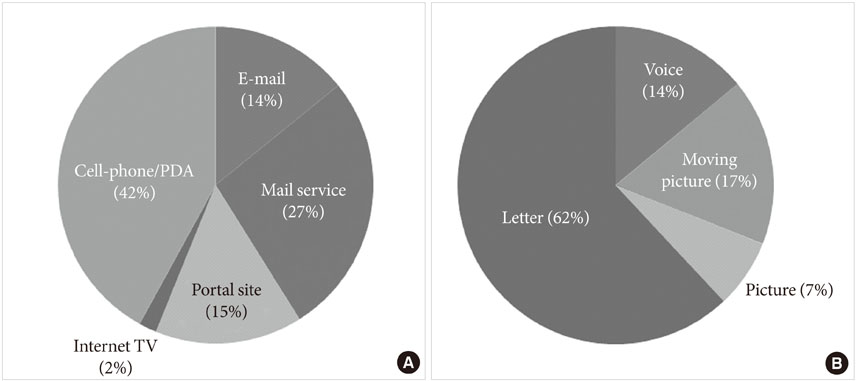Diabetes Metab J.
2011 Feb;35(1):50-57. 10.4093/dmj.2011.35.1.50.
A Survey on Ubiquitous Healthcare Service Demand among Diabetic Patients
- Affiliations
-
- 1Department of Medical Informatics, Seoul National University Bundang Hospital, Seoul National University College of Medicine, Seongnam, Korea. janghak@snu.ac.kr
- 2Department of Internal Medicine, Seoul National University Bundang Hospital, Seoul National University College of Medicine, Seongnam, Korea.
- 3Department of Internal Medicine, Seoul National University College of Medicine, Seoul, Korea.
- 4Allmedicus Research Institute, Allmedicus Co., Ltd., Anyang, Korea.
- 5Johns Hopkins Bloomberg School of Public Health, Baltimore, MD, USA.
- KMID: 2281492
- DOI: http://doi.org/10.4093/dmj.2011.35.1.50
Abstract
- BACKGROUND
Advanced information technology can be used when developing diagnostic and treatment strategies to provide better care for diabetic patients. However, the levels of need and demand for the use of technological advances have not been investigated in diabetic patients. We proposed and developed an individualized, ubiquitous (U)-healthcare service using advanced information technology for more effective glucose control. Prior to our service initiation, we surveyed patient needs and other pertinent information.
METHODS
During August 2009, we conducted a 34-item questionnaire survey among patients with diabetes who were older than 40 years in two certain hospitals in Korea.
RESULTS
The mean age of the 228 participants was 61.2+/-9 years, and males made up 49.1% of the sample. Seventy-one percent replied that they wanted individualized healthcare service, and they also wanted their health information to be delivered through mobile devices such as a cellular phone or a personal digital assistant (40.4%). Most patients had never heard of U-healthcare services (81.1%); however, after explaining the concept, 71.1% of participants responded that they would use the service if it was provided. Despite their willingness, participants were concerned about technical difficulty in using the service (26.3%) as well as the cost of the service (29.8%).
CONCLUSION
The current study suggests that more than 70% of diabetic patients are interested in using U-healthcare services. To encourage widespread use, the application program or device of U-healthcare services should be simple, easy to use and affordable while also including a policy for the protection of private information.
MeSH Terms
Figure
Cited by 3 articles
-
Perception of Influencing Factors on Acceptance of Mobile Health Monitoring Service: A Comparison between Users and Non-users
Jaebeom Lee, Mi Jung Rho
Healthc Inform Res. 2013;19(3):167-176. doi: 10.4258/hir.2013.19.3.167.Current Clinical Status of Telehealth in Korea: Categories, Scientific Basis, and Obstacles
Hun-Sung Kim, Hyunah Kim, Suehyun Lee, Kye Hwa Lee, Ju Han Kim
Healthc Inform Res. 2015;21(4):244-250. doi: 10.4258/hir.2015.21.4.244.Satisfaction Survey on Information Technology-Based Glucose Monitoring System Targeting Diabetes Mellitus in Private Local Clinics in Korea
Hun-Sung Kim, So Jung Yang, Yoo Jin Jeong, Young-Eun Kim, Seok-Won Hong, Jae Hyoung Cho
Diabetes Metab J. 2017;41(3):213-222. doi: 10.4093/dmj.2017.41.3.213.
Reference
-
1. Choi I, Kim S, Kwon YD. Key aspects of using web-based diabetes telemedicine systems in multiple clinical settings. J Korean Soc Med Inform. 2007. 13:375–383.2. Connecting for Health; John and Mary R. Markle Foundation. Connecting for health: a public-private collaborative. Personal Health Working Group: final report. 2003. New York: Markle Foundation.3. Park KS, Kim NJ, Hong JH, Park MS, Cha EJ, Lee TS. PDA based point-of-care personal diabetes management system. J Korean Soc Med Inform. 2004. 10:339–346.4. Lee HJ, Lee SH, Ha KS, Jang HC, Chung WY, Kim JY, Chang YS, Yoo DH. Ubiquitous healthcare service using Zigbee and mobile phone for elderly patients. Int J Med Inform. 2009. 78:193–198.5. Yu SH, Kim SH, Kim SY, Choi SH, Lim S, Chang YS, Lee HJ, Park YJ, Jang HC. Effects of 'ubiquitous healthcare' on the ability of self-management in elderly diabetic patients. Korean Diabetes J. 2009. 33:58–64.6. Baker L, Wagner TH, Singer S, Bundorf MK. Use of the Internet and e-mail for health care information: results from a national survey. JAMA. 2003. 289:2400–2406.7. Gómez EJ, del Pozo F, Hernando ME. Telemedicine for diabetes care: the DIABTel approach towards diabetes telecare. Med Inform (Lond). 1996. 21:283–295.8. Funnell MM, Haas LB. National Standards for Diabetes Self-Management Education Programs. Diabetes Care. 1995. 18:100–116.9. National Standards for Diabetes Self-Management Education Programs and American Diabetes Association review criteria. Diabetes Care. 1995. 18:737–741.10. Cho JH, Chang SA, Kwon HS, Choi YH, Ko SH, Moon SD, Yoo SJ, Song KH, Son HS, Kim HS, Lee WC, Cha BY, Son HY, Yoon KH. Long-term effect of the Internet-based glucose monitoring system on HbA1c reduction and glucose stability: a 30-month follow-up study for diabetes management with a ubiquitous medical care system. Diabetes Care. 2006. 29:2625–2631.11. Yoo HJ, Park MS, Kim TN, Yang SJ, Cho GJ, Hwang TG, Baik SH, Choi DS, Park GH, Choi KM. A ubiquitous chronic disease care system using cellular phones and the internet. Diabet Med. 2009. 26:628–635.12. National Computerization Agency. 2005 White paper internet Korea. 2005. Seoul: National Computerization Agency.13. Lee YJ, Jeong MH, Kim JH, Park J, Kim HY, Seo JA, Kim SG, Kim NH, Choi KM, Baik SH, Choi DS. The effect of cellular phone-based telemedicine on glycemic control in type 2 diabetes patients using insulin therapy. Korean Diabetes J. 2009. 33:232–240.14. Kim J, Lee S, Park S, Piao M, Joo J, Kim S. Comparison of physicians' and patients' perception on the effect of internet health information. J Korean Soc Med Inform. 2009. 15:373–379.15. Kim J, Kwak M, Kim E, Kwon CI, Kim Y. A survey of health consumers' attitude of personnel health management service using PHR. J Korean Soc Med Inform. 2008. 14:329–343.
- Full Text Links
- Actions
-
Cited
- CITED
-
- Close
- Share
- Similar articles
-
- Service Demand for and Awareness of a Primary Healthcare Pilot Project for People With Disabilities
- Ubiquitous Health in Korea: Progress, Barriers, and Prospects
- Variables in the projection of physician demand and supply in primary care
- Diabetes Management System Based on Ubiquitous Healthcare
- The Survey of the Demand for Health Information on the Internet


